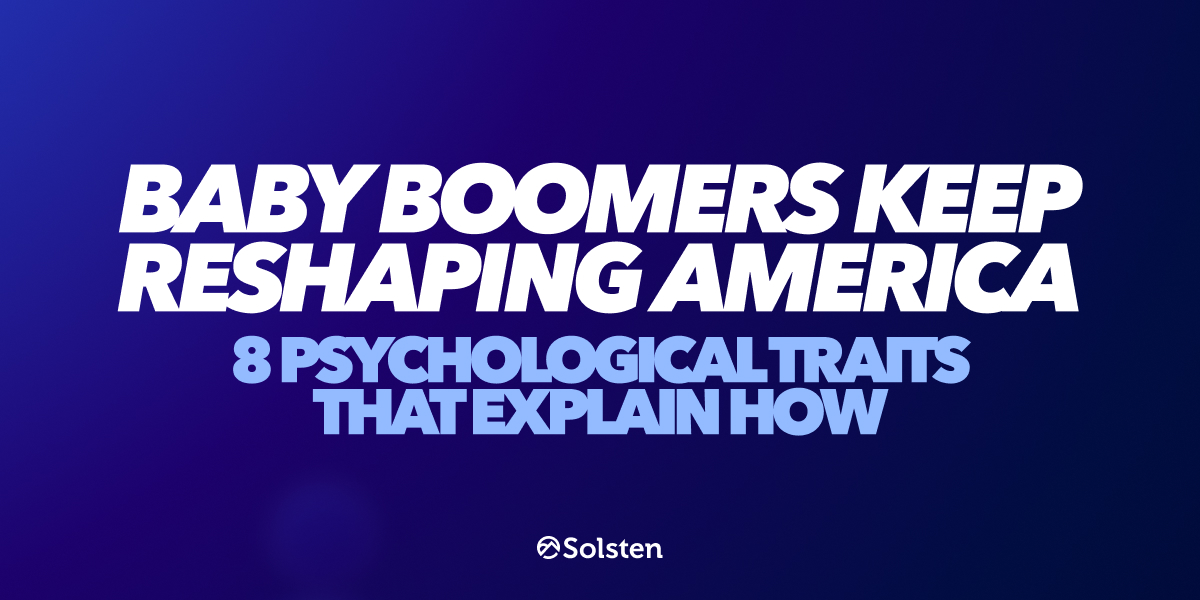Baby Boomers have already left an indelible mark on American society. From civil rights and women’s liberation to technological innovation and economic expansion, they’ve driven transformative change across every facet of American life. Born between 1946 and 1964, baby boomers are aged approximately 60-79 in 2025. Many assume their influence is waning as 10,000 Boomers retire every day, but this assumption couldn’t be further from the truth.
While media narratives often position Baby Boomers as passing the torch to younger generations, our psychological data reveals a generation whose influence is evolving rather than diminishing. With over $30 trillion in wealth transfer underway, record-high political participation, and outsized representation in leadership positions, Baby Boomers remain powerful architects of America’s future.
Curious about psychological patterns driving other generational trends? Elaris lets you explore insights across any demographic through simple conversation. Explore now.
New data from Solsten‘s ongoing assessment, representing 3.4 billion people globally, reveals that Baby Boomers possess a unique trait profile that positions them to continue shaping American institutions, culture, and politics well into the 2030s. Born during post-war prosperity and coming of age during social upheaval, their psychological makeup combines stability with change-orientation in ways that make continued influence both possible and inevitable.
Let’s explore the eight key psychological traits and characteristics that show why Baby Boomers aren’t done shaping America.
Each trait in this article is expressed as a percentile on a scale from 0-100, offering a quantitative insight into Baby Boomer psychographics. You can learn more about Solsten’s methodology and data collection here.
Explore Baby Boomer psychology and cross-generational insights instantly
The Baby Boomer analysis above demonstrates the power of psychological data to reveal unexpected truths about generational behavior. Now you can access these insights through conversation with Elaris. Ask questions like “How do Baby Boomer leaders differ from Millennial leaders?” or “What psychological traits make Boomers effective mentors?”
Get instant insights from the world’s largest psychological database.
Discover generational insights
1. Stable-Mindedness: Resilience Through Disruption
Data Point: Baby Boomer women score 60 and men score 61 on Stable-Mindedness, the highest of every generation
Baby Boomers score remarkably high on Stable-Mindedness, the trait measuring emotional resilience and equilibrium under pressure. Their scores significantly exceed those of younger generations, with minimal gender difference.
This characteristic allows Baby Boomers to navigate contemporary social and technological disruption without the psychological reactivity often seen in younger cohorts. While digital transformation has created anxiety across society, Baby Boomers are steadily increasing their technological adoption while maintaining perspective on which innovations matter. Their emotional resilience also explains their continuing effectiveness in leadership roles despite rapid change. They provide stability amid transformation.
The minimal gender difference (men scoring just one point higher) suggests this trait transcends gender lines among Baby Boomers, creating a generation psychologically equipped to influence America’s future direction with measured perspective rather than reactive anxiety.
These evolving generational patterns represent just one example of the dynamic psychological insights available through Elaris, where you can explore how any demographic’s psychology shapes their behavior and decision-making.
2. Trust: Institutional Stewardship
Data Point: Baby Boomer women score 63 and men score 58 on Trust, the highest of every generation
Baby Boomers score higher on Trust than all younger generations, particularly among women. This trait measures belief in others’ goodwill and reliability, including institutional trustworthiness.
This high trust now positions Baby Boomers as critical institutional stewards during an era of declining institutional confidence. While younger generations demonstrate growing skepticism toward traditional institutions, Baby Boomers maintain higher civic participation, institutional philanthropy, and leadership in everything from houses of worship to community organizations. Their trust in systems also explains their continuing political influence, as they vote at nearly twice the rate of Gen Z and remain highly engaged in the mechanisms of governance.
The gender difference (women scoring five points higher) tell us that Baby Boomer women may be particularly important in preserving institutional knowledge and maintaining organizational continuity during leadership transitions, potentially explaining their growing representation on nonprofit boards and in executive director roles.
3. Fearlessness: Calculated Risk-Taking
Data Point: Baby Boomer women score 58 and men score 60 on Fearlessness, the highest of every generation
Baby Boomers score high on Fearlessness, a trait that measures comfort with uncertainty, risk, and navigating unfamiliar terrain.
This characteristic helps Baby Boomers embrace significant social and technological changes rather than resisting them. Despite stereotypes about age-related conservatism, Baby Boomers are launching businesses at higher rates than Millennials and adopting new technologies faster than predicted. Their comfort with calculated risk also explains their impact on investment patterns, as they’re directing unprecedented capital toward both innovative startups and social impact investments rather than simply preserving wealth.
The modest gender difference (men scoring two points higher) tells us that fearlessness characterizes the generation broadly, creating a group that continues to drive change rather than merely adapting to it, regardless of gender.
4. Self-Control: Strategic Patience
Data Point: Baby Boomer women score 51 and men score 46 on Self-Control
Baby Boomers, particularly women, score high on Self-Control, the trait measuring ability to regulate behavior toward long-term goals despite short-term desires.
This self-control now manifests in Baby Boomers’ approach to long-term societal challenges that younger generations often address with greater urgency but less strategic patience. On issues from climate change to racial equity, Baby Boomers are increasingly directing their substantial resources toward systemic solutions with multi-decade horizons. This disciplined approach also explains their growing influence in multi-generational planning, as they structure wealth transfers and institutional leadership transitions to extend their influence well beyond their lifetimes.
The substantial gender difference (women scoring five points higher) suggests Baby Boomer women may be particularly effective at maintaining focus on long-term societal goals, potentially explaining their increasing leadership in foundations and endowments designed for multigenerational impact.
5. Altruism: Legacy Through Service
Data Point: Baby Boomer women score 64 and men score 48 on Altruism, the largest gender gap of any generation
Baby Boomers show the largest generational gender gap in Altruism. While both score highest of any generation by gender, women score significantly higher than men. This trait measures concern for others’ welfare and willingness to act on their behalf.
This altruism pattern now fuels Baby Boomers’ focus on legacy-building through service. Rather than simply enjoying retirement, they’re launching second and third careers in mission-driven organizations, creating record numbers of family foundations, and driving the largest intergenerational wealth transfer in history with increasingly sophisticated philanthropic structures. This characteristic also explains their growing influence in addressing societal challenges. Baby Boomers volunteer more hours and direct more resources toward community needs than any previous generation at the same age.
The dramatic gender difference (women scoring 16 points higher) suggests Baby Boomer women may be particularly influential in reshaping American social safety nets and community support systems as government services evolve, potentially explaining their leadership in creating innovative public-private partnerships to address social needs.
6. Moderation: Balanced Leadership
Data Point: Baby Boomer women and men both score 65 on Moderation
Baby Boomers score exceptionally high on Moderation; higher than all younger generations with almost identical scores across genders. This trait measures preference for balanced approaches rather than extremes.
This moderation now positions Baby Boomers as crucial moderating influences in increasingly polarized environments. From boardrooms to community organizations to political movements, they frequently serve as bridge-builders between competing perspectives. Their balanced approach also explains their effectiveness in managing generational transitions. They facilitate evolution rather than revolution when transferring leadership to younger generations.
The lack of gender difference tells us that moderation deeply characterizes the entire generation, creating a cohort that continues to value measured change over extremism regardless of gender.
7. Warmth: Relational Intelligence
Data Point: Baby Boomer women score 57 and men score 59 on Warmth
Baby Boomers score high on Warmth, a trait that measures the value close interpersonal connections. Interestingly, men score higher than women on this trait across every generation, with Boomers scoring highest.
This warmth now shows up in Baby Boomers’ effectiveness at cross-generational relationship building. Unlike stereotypes of generational conflict, many Boomers maintain close mentoring relationships with younger colleagues while simultaneously serving as connectors across age groups in communities and organizations. Their relational intelligence explains their ongoing leadership influence, as they build personal connections that drive organizational change through relationships rather than pure authority.
The gender difference across generations challenges stereotypes about women’s dominance in relational skills, suggesting men of all ages serve as important bridges between traditional leadership and today’s more collaborative approaches.
8. Empathy: Understanding Across Difference
Data Point: Baby Boomer women score 54 and men score 43 on Empathy, the highest of every generation
Baby Boomers show a huge gender gap in Empathy, a trait that measures the ability to understand and share others’ emotional experiences. Baby Boomer women score particularly high while men score relatively low. While this gender disparity exists across generations, it is most pronounced amongst Boomers.
This empathy pattern now positions Baby Boomer women as particularly effective navigators of increasing social diversity. Their ability to understand different perspectives helps them build bridges across demographic divides that challenge younger generations. Their high empathy also explains their effectiveness in multi-generational contexts, since they can translate between different generational perspectives while finding common ground.
The substantial gender gap in empathy scores (women scoring 11 points higher) suggests Baby Boomer women play a vital role in helping organizations navigate complex social changes around identity and inclusion. This may explain why they are increasingly recruited for leadership positions during organizational culture transformations.
Conclusion: The Continuing Influence of Baby Boomers
As Baby Boomers navigate their 60s and 70s, their psychographic profile reveals why their influence on American society isn’t waning, but is evolving into new forms that may prove even more enduring than their earlier impact.
Their Stable-Mindedness and Trust position them as necessary stabilizers during social and institutional turbulence. Their Fearlessness and Self-Control let them take calculated risks with long-term vision. Their high Altruism drive legacy-building through service and relationship-centered approaches. Their strong Empathy and Moderation facilitate bridge-building across demographic divides. And their notable Competence and Warmth enable practical problem-solving through collaborative leadership.
These characteristics explains why Baby Boomers aren’t simply passing the torch to younger generations but are actively shaping how that torch will be carried. Through mentorship, philanthropy, continued leadership, and unprecedented wealth transfer, they’re embedding their values and approaches into institutions and systems that will outlast their direct involvement.
As we navigate complex societal challenges from technological disruption to demographic shifts, understanding Baby Boomers’ psychological makeup becomes increasingly important. Their continuing influence isn’t merely the product of demographic size or economic power but of a specific psychological profile that positions them as particularly effective architects of gradual, sustainable transformation.
The data points to a future in which Baby Boomers continue to shape society well into the 2030s and beyond, not clinging to past achievements but actively designing the frameworks through which future generations will build upon their legacy.
Want dive into your customers’ psychology? Check out our step-by-step tutorial and start turning insights into action today.
Navigate generational differences with psychological understanding
This Baby Boomer analysis reveals how psychological traits drive leadership styles, decision-making, and influence patterns. Whether you’re managing multi-generational teams, targeting different age demographics, or understanding family dynamics, Elaris provides instant psychological insights about any generation.





